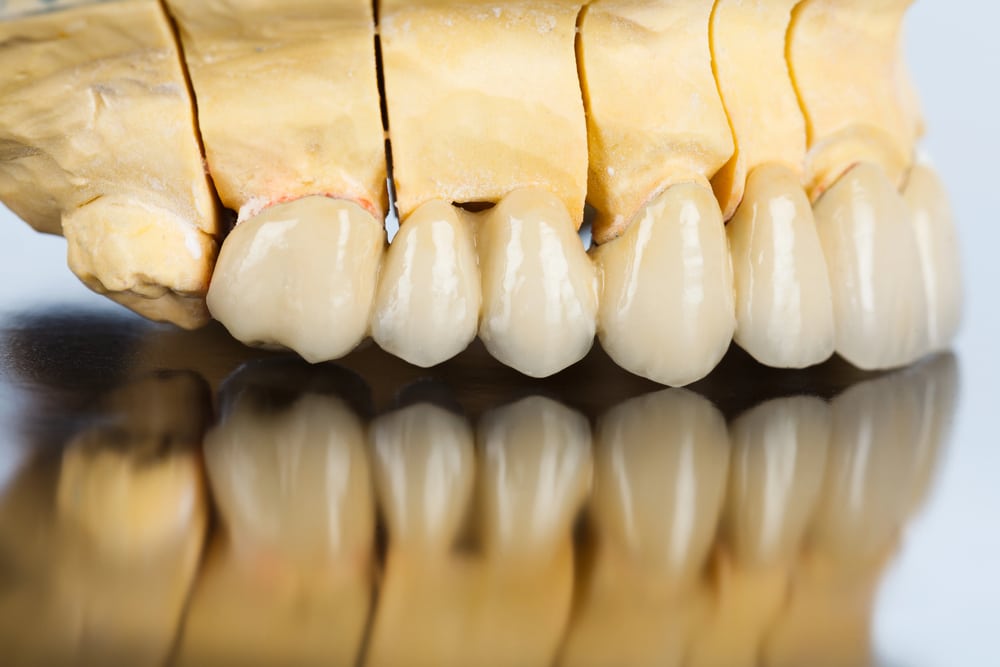Article At A Glance
- Implants closely mimic natural teeth and support jawbone health, while bridges utilize adjacent teeth for support.
- Dental implants are preferred for long-term results but involve a longer treatment plan and higher initial costs.
- Bridges are a quicker and less invasive option, but their reliance on adjacent teeth can lead to complications over time.
When addressing the issue of missing teeth, the debate between dental bridges and implants often centers on factors like durability, aesthetics, and, most importantly, jawbone preservation. Both solutions offer unique benefits, but understanding which aligns with your oral health goals can make all the difference. This guide will explain the advantages, disadvantages, and decision factors of choosing between these two treatment options.
Implants Vs. Bridges: Benefits, Drawbacks, And Decision Factors
Deciding between dental implants and bridges requires a thorough understanding of their roles in maintaining oral health. Dental implants are known for closely mimicking natural teeth, including jawbone support. In this procedure, a dental surgeon places a titanium post into the bone, serving as an artificial tooth root. Dental bridges rely on adjacent teeth to support false teeth, making them a faster and less invasive option, though lacking the bone-preserving qualities that implants provide.
Patients prefer dental implants because they look natural and help maintain the health of the jawbone. The implant placement process offers long-term benefits, supporting bone growth and preventing bone resorption. However, patients need to consider the healing time and period of healing involved, as these factors can extend the overall treatment plan.
Advantages And Disadvantages Of Implants And Bridges
Dental Implants are a permanent solution that stimulates the jawbone, preventing bone deterioration. They are preferred when considering long-term results, offering stability, a natural tooth structure, and a lifelike chewing function. However, the process involves more than just implant placement; additional procedures like bone grafts or oral surgery may be necessary for those with insufficient bone density. Although implants carry higher initial costs, they provide lasting benefits, including maintaining facial structure and supporting dental prosthetics.
Dental Bridges, mainly traditional bridges, are supported by the teeth adjacent to the gap. They are effective for patients who want quicker results, as the process typically doesn’t involve surgery. However, bridges do not offer the same stability as implants, and their reliance on adjacent healthy teeth can lead to serious issues like tooth decay. Over time, bridges may require replacement due to wear or shifts in the remaining teeth, mainly if a resin-bonded bridge or porcelain wings are used, affecting durability.
Price Comparison: Implants Vs. Bridges
The upfront cost of dental implants is generally higher due to the surgical procedure, premium materials like titanium, and the additional steps involved. However, this initial cost is often offset by implants’ longevity and minimal maintenance, making them a long-term investment. On the other hand, dental bridge costs are lower initially, but frequent replacements and potential additional treatments add up over time. A permanent bridge typically lasts 5-15 years, whereas implants can last a lifetime with proper care.
Bridges are a viable option for those considering a more budget-friendly option, but it’s essential to weigh the costs against the potential dental issues that may arise over time. Candidates for implants should also factor in the expense of additional treatments like bone grafting if necessary.
Making a choice: Dental Implants Or Bridges?
Your decision should consider several critical factors:
- Jawbone Health: Dental implants maintain jawbone health by serving as artificial tooth roots that stimulate bone growth and deter resorption. This process helps prevent bone loss, ensuring long-term oral health.
- Tooth Loss and Adjacent Teeth: Bridges may compromise the integrity of adjacent teeth as they rely on them for support. Implants are independent structures, protecting the health of surrounding teeth and providing a stable foundation for artificial teeth.
- Aesthetic and Functional Goals: Dental implants provide a natural appearance and functionality. Implant-supported dental prosthetics are designed to replicate the look and feel of natural teeth while enhancing stability.
For some patients, a resin-bonded bridge or other less invasive options might be a suitable option, especially when immediate results are desired. However, implants’ stability and long-term health benefits make them a more attractive treatment option in most cases.
Durability And Stability: Comparing Tooth Replacement Options
Regarding durability, dental implants outperform bridges, offering a stable foundation that closely mimics a real tooth. This stability comes from the fusion of the titanium post with the jawbone, ensuring a solid base for the replacement tooth. Bridges, while functional, may become less stable over time, leading to shifts or the need for replacements. Additionally, the type of bridge chosen—whether traditional, cantilever, or implant-supported—affects the longevity and effectiveness of the solution.
Implants also support implant-supported dentures, which provide additional stability for those replacing multiple consecutive teeth. These options offer improved chewing function and contribute to maintaining natural tooth structure and jawbone health.
Additional Read: Dental Implant Benefits For Improved Oral Health
Achieving A Lifelike Smile: Aesthetic Considerations
Implants and bridges aim to restore your smile, but their long-term aesthetic outcomes differ. Dental implants are often favored for their ability to blend seamlessly with surrounding teeth, maintaining a natural appearance even after years. In contrast, the appearance of bridges can deteriorate due to bone loss underneath, which may affect the overall look. Implant-supported dental crowns offer the best of both worlds, delivering both functional and cosmetic benefits.
Considering the healing period and treatment plan is crucial for those prioritizing aesthetics. While bridges may be a more common type of restoration, the impact of bone deterioration and the need for frequent replacements should be factored in when choosing.
Long-Term Health And Value: Bone Preservation And Cost-Efficiency
The critical difference between these two treatment options lies in bone preservation. Dental implants effectively maintain bone density by stimulating the bone, much like a natural tooth root. This supports your facial structure and prevents long-term issues like bone resorption and deterioration. Bridges, while capable of replacing missing teeth, do not offer the same benefits, often leading to jawbone shrinkage and affecting oral health.
Choosing the right dental professional is essential in determining the best approach for your needs. A well-qualified dentist can evaluate your oral health, assess whether you require additional procedures like bone grafts, and recommend a solution tailored to your preferences and financial considerations.
Choose The Right Tooth Replacement Option at Affinity Dental
Dental bridges and implants each have advantages, but implants generally offer a superior solution for those concerned about jawbone health. They are a long-lasting, stable foundation that not only restores function but also preserves the bone and maintains the appearance of a natural smile. Bridges remain viable for those seeking a quicker, less invasive fix, particularly when adjacent teeth are healthy enough to support them. Consulting with our professional team at Affinity Dental will ensure that your decision aligns with your oral health goals and personal circumstances. Ready to enhance your smile? Contact us at 773-904-7079. to schedule an appointment and discover more today.


